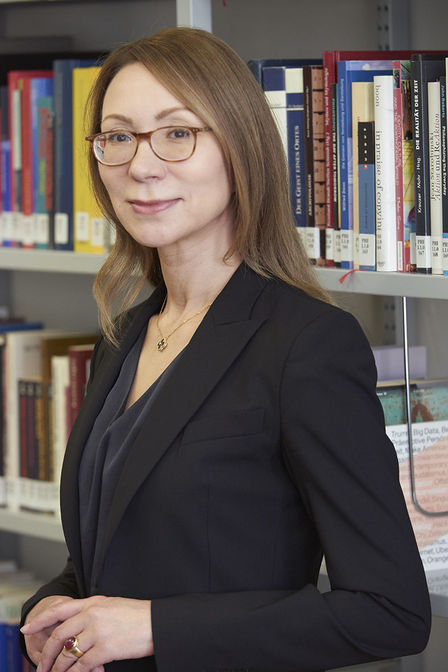Prof. Dr. Fatima Fay Kastner

f.kastner@khm.de
Fatima Kastner studied law, philosophy and sociology at the London School of Economics and Political Science (LSE) and at the Collège International de Philosophie (CIPh) in Paris, before completing her doctorate at the Goethe University Frankfurt and qualifying as a university lecturer at Bielefeld University. Kastner worked as a lecturer in social sciences at the University of Hamburg from 2004 to 2010. During the same period she worked as a research assistant at the Hamburg Institute for Social Research in the field of “nation and society”, where she was subsequently senior research fellow, from 2011 to 2013.
Fatima Kastner has been a co-opted member of the Institute for World Society at Bielefeld University since 2010 and cooperating researcher for the research training group “World Politics: The Emergence of Political Arenas and Modes of Observation in World Society”, financed by the Deutschen Forschungsgemeinschaft (DFG), since 2016. Furthermore, she has been Ambassador for Science and Culture at the Berlin-Brandenburg Academy of Sciences and Humanities (BBAW) since 2014, where she planned and realised the exhibition series “Art meets Science” with Jens Schreiner, which was sponsored by the Federal Ministry of Education and Research (BMBF). Kastner supervised the project “Sociology of the Constitution: Social Constitutionalism in Globalisation” at the Käte Hamburger Kolleg “Recht als Kultur” of the University of Bonn from 2016 to 2017.
Fatima Kastner is an active member in the executive committees of renowned national and international academic associations. She also works as a consultant for high-ranking journals and research institutions. She received the Adam Podgòrecki Prize from the Research Committee on Sociology of Law (RCSL) of the International Sociological Association (ISA) in the category “outstanding achievements in socio-legal research” as well as the “Early Career Award” in the German section of the International Association for Philosophy of Law and Social Philosophy (IVR), among others.
Fatima Kastner has been professor of globalisation discourses and digital transformation at the Academy of Media Arts Cologne since 2018.
Research focus
Comparative globalisation research; theories of global society, global culture and global art; mechanisms of the global expansion of ideas and cultural patterns and their effects at local level; internationalisation of criminal tribunals and truth and reconciliation commissions; global culture of remembrance and transitional justice; changing interpretations and modes of action of universal human rights in national, regional and transnational spaces; dynamics of social inclusion/exclusion; digital society, law and robotics
Publications (selection)
Transitional Justice in der Weltgesellschaft. Hamburg: Hamburger Edition 2015 (postdoctoral thesis);
From Globalization to World Society. Neo-Institutional and Systems-Theoretical Perspectives. New York: Routledge 2015 (with Boris Holzer and Tobias Werron);
Niklas Luhmann. Law as a Social System. Oxford: Oxford University Press 2008 (with Richard Nobles, David Schiff and Rosamund Ziegert);
Academia in Transformation. Baden-Baden: Nomos Verlag 2018 (with Sarhan Dhouib, Florian Kohstall and Carola Richter);
Haben Roboter Rechte? Konstruktionen von Individualität und Personalität in der digitalen Gesellschaft. In: Erik Hilgendorf and Benno Zabel (eds.), Die Idee der subjektiven Rechte. Tübingen: Mohr Siebeck 2018;
Soziologie der Menschenrechte: Zur Universalisierung von Unrechtserfahrungen in der Weltgesellschaft. In: Österreichische Zeitschrift für Soziologie, Jg. 42, Heft 3. Wiesbaden: Springer Verlag 2017, p. 217-236;
Transitional Justice: Von der normativen Ausnahme zur weltpolitischen Regel. In: Klaus Ebeling et al (eds.), Handbuch Friedensethik, Stuttgart: Springer Verlag 2016, p. 893-902;
Weltkultur der Versöhnung: Zur Ausbreitung vergangenheitspolitischer Normen, Standards und Institutionen von Transitional Justice in der Weltgesellschaft. In: Claudia Fröhlich and Harald Schmid (eds.), Jahrbuch für Politik und Geschichte Band 6. Stuttgart: Franz Steiner Verlag 2016, p. 47-59;
Lex Transitus: Zur Emergenz eines globalen Rechtsregimes von Transitional Justice in der Weltgesellschaft. In: Zeitschrift für Rechtssoziologie Band 36 (2015), Heft 1, S. 29-47;
Globale Dissensformel: Zur politischen Macht der Menschenrechte aus weltgesellschaftlicher Perspektive. In: Erwägen, Wissen, Ethik. Forum für Erwägungskultur – Forum for Deliberative Culture, Jg. 24 (2013), Heft 2, S. 230-233;
Selbstbeschreibungen ohne Selbst: Gesellschaftliche Umbrüche, Vergangenheitsbewältigung und globale Prozesse normativer Strukturbildung aus systemtheoretischer Perspektive. In: Peter Birle et al (eds.), Durch Luhmanns Brille. Herausforderungen an Politik und Recht in Lateinamerika und in der Weltgesellschaft. Wiesbaden: Springer Verlag 2012, p. 75-97;
Retributive versus restaurative Gerechtigkeit. Zur transnationalen Diffusion von Wahrheits- und Versöhnungskommissionen in der Weltgesellschaft. In: Regina Kreide und Andreas Niederberger (eds.), Staatliche Souveränität und transnationales Recht. Munich (e.a.): Hampp Verlag 2010, p. 194-211;
Trojanische Pferde: Universalistische Normen und globaler Wahrheits- und Versöhnungsdiskurs. Zur Evolution der Weltgesellschaft. In: Hauke Brunkhorst (ed.), Demokratie in der Weltgesellschaft. Baden-Baden: Nomos 2009, p. 259-276;
Das Welttheater des Pardons: Zum Verhältnis von Recht, Vergebung und Gedächtnis. In: Gunther Teubner (ed.), Nach Jacques Derrida und Niklas Luhmann. Zur (Un-)Möglichkeit einer Gesellschaftstheorie der Gerechtigkeit. Stuttgart: Lucius u. Lucius 2008, p. 153-165;



